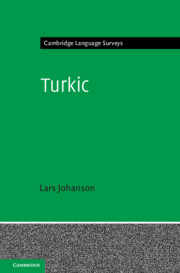Book contents
- Turkic
- Cambridge Language Surveys
- Turkic
- Copyright page
- Contents
- Figures
- Maps
- Tables
- 1 Introduction
- 2 Technicalities
- 3 The Turkic Language Family
- 4 Turcia, the Turkic World
- 5 Status
- 6 Historical Backgrounds
- 7 Cultures
- 8 Linguistic Periodizations
- 9 Registers of Orature and Literature
- 10 Language Contacts
- 11 Lexicon
- 12 Sound Types
- 13 Prime Syllables
- 14 Phonemes in Prime Syllables
- 15 Polysyllabic Word Forms
- 16 Diachronic Phonology
- 17 Diachrony: Vowels
- 18 Diachrony: Consonants
- 19 Writing Systems
- 20 Morphology: Generalities
- 21 Nominals: Nouns
- 22 Nominals: Noun Inflection
- 23 Nominals: Adjectives
- 24 Nominals: Pronominals
- 25 Quantifiers and Numerals
- 26 Postpositions
- 27 Copular Devices
- 28 Verb Stems
- 29 Postverbial Constructions
- 30 Finite Verbals
- 31 Verbals: Viewpoint Aspect
- 32 Old Intraterminals: Aorists
- 33 Focal Intraterminals
- 34 Postterminals
- 35 Terminals
- 36 Imperatives
- 37 Modality
- 38 Voluntatives
- 39 Optatives
- 40 Hypotheticals
- 41 Further Modals
- 42 Copular Particles of Thematic Bases
- 43 Nonfinite Verbals
- 44 Participant Nominals
- 45 Action Nominals
- 46 Converbs
- 47 Adverbs
- 48 Function Words
- 49 Interjections
- 50 Word Accents
- 51 Syntactic Levels
- 52 Nominal Phrases
- 53 Verbal Phrases
- 54 Main Clauses
- 55 Nonmain Clauses
- 56 Sentences
- 57 Above the Sentence Level
- 58 Prosody
- 59 Functional Synopses
- References
- Index of linguistics and historical backgrounds
- Index of languages and dialects
- Index of subjects
39 - Optatives
Published online by Cambridge University Press: 13 August 2021
- Turkic
- Cambridge Language Surveys
- Turkic
- Copyright page
- Contents
- Figures
- Maps
- Tables
- 1 Introduction
- 2 Technicalities
- 3 The Turkic Language Family
- 4 Turcia, the Turkic World
- 5 Status
- 6 Historical Backgrounds
- 7 Cultures
- 8 Linguistic Periodizations
- 9 Registers of Orature and Literature
- 10 Language Contacts
- 11 Lexicon
- 12 Sound Types
- 13 Prime Syllables
- 14 Phonemes in Prime Syllables
- 15 Polysyllabic Word Forms
- 16 Diachronic Phonology
- 17 Diachrony: Vowels
- 18 Diachrony: Consonants
- 19 Writing Systems
- 20 Morphology: Generalities
- 21 Nominals: Nouns
- 22 Nominals: Noun Inflection
- 23 Nominals: Adjectives
- 24 Nominals: Pronominals
- 25 Quantifiers and Numerals
- 26 Postpositions
- 27 Copular Devices
- 28 Verb Stems
- 29 Postverbial Constructions
- 30 Finite Verbals
- 31 Verbals: Viewpoint Aspect
- 32 Old Intraterminals: Aorists
- 33 Focal Intraterminals
- 34 Postterminals
- 35 Terminals
- 36 Imperatives
- 37 Modality
- 38 Voluntatives
- 39 Optatives
- 40 Hypotheticals
- 41 Further Modals
- 42 Copular Particles of Thematic Bases
- 43 Nonfinite Verbals
- 44 Participant Nominals
- 45 Action Nominals
- 46 Converbs
- 47 Adverbs
- 48 Function Words
- 49 Interjections
- 50 Word Accents
- 51 Syntactic Levels
- 52 Nominal Phrases
- 53 Verbal Phrases
- 54 Main Clauses
- 55 Nonmain Clauses
- 56 Sentences
- 57 Above the Sentence Level
- 58 Prosody
- 59 Functional Synopses
- References
- Index of linguistics and historical backgrounds
- Index of languages and dialects
- Index of subjects
Summary
The Turkic optative fulfills a wide range of functions developed along various diachronic paths. It is a modal category with volitional, deontic, and epistemic functions, maybe originally with a previsional meaning of predetermination ordained by a higher force, i.e. divine decree or fate. Common to all Turkic optatives are volitional notions of will, wish, desire, hope, expectation, aspiration, purpose, incitement, inducement, invocation, and promise. These notions have often led to deontic and epistemic notions of potentiality, prediction, obligation, necessity, and counterfactuality. The use of the optative to express deontic modality has given rise to senses of epistemic modality, a well-known typological path of development. Compare the use of the modern English auxiliary ‹may› both for strong wishes, e.g. ‹May X act›, and for deontic and epistemic possibility, e.g. ‹X may act›. The overall functions are similar to those of the old Indo-European optative, an irrealis modality expressing wish, possibility, necessity, etc. Some Turkic optatives have also been employed as conditionals.
- Type
- Chapter
- Information
- Turkic , pp. 692 - 701Publisher: Cambridge University PressPrint publication year: 2021



